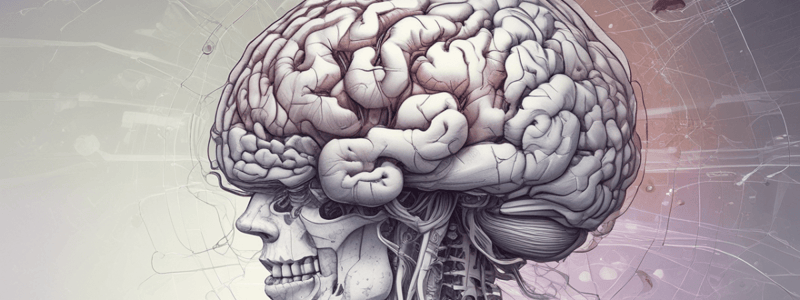Podcast
Questions and Answers
What is the main focus of the course 'Behavior and Brain 2 - Cognitive Neuroscience'?
What is the main focus of the course 'Behavior and Brain 2 - Cognitive Neuroscience'?
- Brain anatomy only
- Evolutionary history of the nervous system
- Perception and consciousness only
- Mechanistic reasoning, brain anatomy, brain imaging, cognitive and mental processes (correct)
What type of study materials are mandatory for the course?
What type of study materials are mandatory for the course?
Brain and Behavior: A Cognitive Neuroscience Perspective by David Eagleman and Jonathan Downar, plus lectures as mandatory study material.
Tutorial attendance is optional for students in the course.
Tutorial attendance is optional for students in the course.
False (B)
A missed tutorial must be compensated with recording a __________ presentation on an assigned topic.
A missed tutorial must be compensated with recording a __________ presentation on an assigned topic.
Flashcards are hidden until you start studying
Study Notes
Course Information
- Course name: Cognitive Neuroscience
- Course code: P_BBAC_2
- Credits: 6EC
- Period: P6
- Course level: 200
- Language: English
- Faculty: Fac.of Behavioural and Movement Science
Course Coordinator and Teaching Staff
- Course Coordinator: Dr. J.J. Fahrenfort
- Examiner: Dr. J.J. Fahrenfort
- Teaching Staff: Dr. J.J. Fahrenfort
Course Objectives
- Learn about mechanistic reasoning, brain anatomy, brain imaging, and cognitive and mental processes
- Understand neural plasticity, perception, memory, attention, consciousness, and mental life
- Gain knowledge of research methods used in cognitive neuroscience
- Understand the degree to which human behavior and mental life can be understood in terms of the architecture and computational principles of the brain
Course Design
- Taught full-time in period 6
- Consists of three lectures a week, self-study, and tutorial meetings
- Lectures: Tuesday, Wednesday, and Thursday
- Tutorial meetings: Friday
Learning Objectives
- Gain a basic understanding of explanatory models in cognitive neuroscience (computational, mechanistic)
- Obtain a broad overview of the history of cognitive neuroscience
- Gain basic knowledge of the architecture of the brain and the evolutionary history of the nervous system
- Gain basic knowledge of methods and techniques used in cognitive neuroscience (electrophysiology, EEG, fMRI, TMS, and tDCS)
- Understand neural mechanisms involved in vision and perception
- Understand mechanisms involved in neural plasticity and memory
- Obtain a bird's eye view of current neurobiological theories of consciousness and attention
Mandatory Study Materials
- Brain and Behavior: A Cognitive Neuroscience Perspective by David Eagleman and Jonathan Downar (new edition: ISBN: 9780190861650, old edition: ISBN: 9780195377682)
- Lectures are mandatory study material
- Chapters 1-6 and 8-9 are mandatory reading/learning
Tutorial Meetings
- Deliverables: presentations and summary documents
- Presentations: give a presentation about a topic from the study materials
- Summary document: provide a more in-depth treatment of at least two questions that came up during or after the presentation
- Both presentations and summary documents will be graded by tutors
Grades
- Exam: 40 multiple-choice questions about lectures and book
- Final grade: composed of written exam (75%) and work group evaluation (25%)
- Both written exam and work group evaluation must be sufficient to pass the course
- Sufficient partial grades for written exam and work group evaluation carry over to the next year
Studying That Suits You
Use AI to generate personalized quizzes and flashcards to suit your learning preferences.




